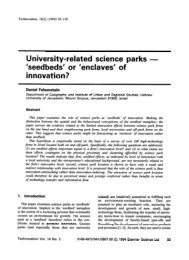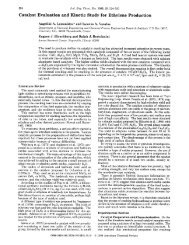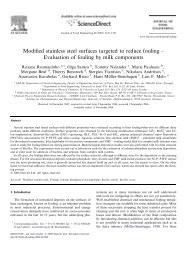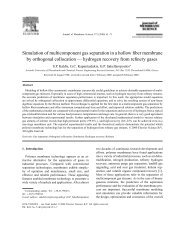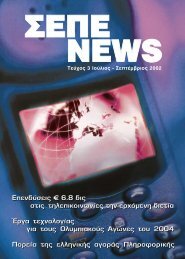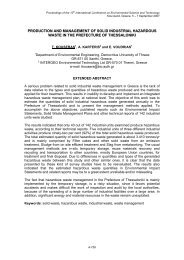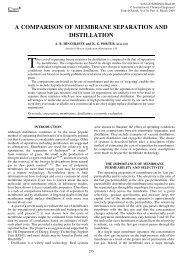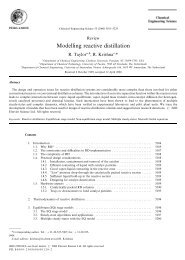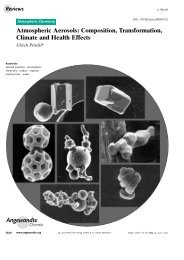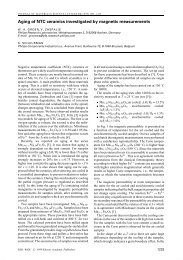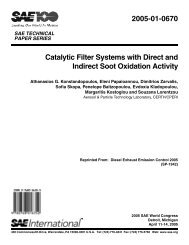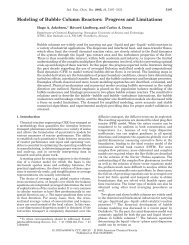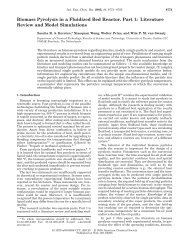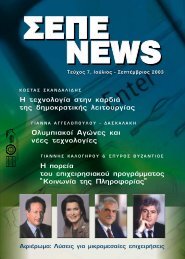RTD info - European Commission - Europa
RTD info - European Commission - Europa
RTD info - European Commission - Europa
Create successful ePaper yourself
Turn your PDF publications into a flip-book with our unique Google optimized e-Paper software.
12<br />
<strong>RTD</strong> <strong>info</strong> Special Science and Media September 2002<br />
R A D I O<br />
The strength<br />
of sound<br />
Can the absence of pictures actually be a strength? Radio journalists certainly<br />
think so. Scoop and sensation are not their priorities and time is a luxury they<br />
can still afford. ‘I don’t try and be too clever, but I do try to be distinctive,’<br />
explains Jacques Olivier, a journalist with Belgian French-speaking radio.<br />
C<br />
‘I can’t write an equation on the blackboard, but I can allow<br />
words to speak.’ This is how Jacques Oliver, a journalist with the<br />
RTBF – the Belgian French-speaking public channel – sums up Chance and the vacuum Every week for two years,<br />
his radio work. The producer of a weekly science programme is from 1998-2000, Jacques Olivier fronted Semences de curieux, presenting<br />
convinced that radio offers scope for a daily programme of this<br />
about 100 programmes in all. This magazine programme<br />
kind. ‘But science is initially rather off-putting. The station came about almost by chance. ‘A radio slot became free and we<br />
bosses often find it complex, boring, and incomprehensible – realised that we didn’t have any science programmes at all. It<br />
and so do the public. That is why it must be presented in clear was this vacuum which brought the response and not the desire<br />
terms, without hurrying to place it in context. It must be to have a science slot in the schedules.’ Significant perhaps?<br />
presented, in a sense, by taking things one step at a time.’ (1)<br />
Speaking of vacuums… Jacques Olivier remembers a series on<br />
F<br />
Planck’s Constant and the vacuum. Although not at first sight particularly<br />
media-friendly subjects, they nevertheless won an audience.<br />
‘There is no miracle recipe, that is the basic rule of journalism.<br />
To make a subject interesting and ensure it gets an audience,<br />
Freed from the screen Radio’s obvious limitation<br />
can be its main asset: by not having pictures you are freed from<br />
you have to prepare it thoroughly, obtain documents, read a great<br />
their control. It is not possible for radio to grab the attention<br />
deal, know what you aim to do and ask the right questions. That<br />
with the dramatic or spectacular (‘radio does not aim to turn<br />
said, on more than one occasion I have listened to scientists without<br />
understanding a word they were saying when I thought<br />
the world on its head whereas television is forced to dramatise<br />
the world’), but what could seem to be a shortcoming is in fact<br />
I had a good grasp of the subject. But that is all part of the game.’<br />
the guarantee of freedom. It is also impossible for radio to focus<br />
on entertainment to the extent that television can. ‘I am sometimes<br />
Since Semences de curieux Jacques Olivier has presented the weekly<br />
perplexed by the playful presentation of science. If you history programme Memo and now dreams of making a new,<br />
really want to improve public understanding of science, I doubt more specific programme on the history of science. ‘Everybody<br />
that it is possible to remain at the entertainment stage without knows Pythagoras’ theorem, but Pythagoras also represents a very<br />
ultimately trivialising it.’<br />
special view of the world which is not necessarily known. History<br />
enables us to put science into perspective, to see where we have<br />
Working alone or in small teams, radio or press journalists have<br />
come from, where we are and – why not? – where we are going.’<br />
their own advantages over television, such as in the quality of the<br />
relationship between the interviewer and interviewee. ‘Relations<br />
can become deeper and more intimate. There is time to discuss,<br />
prepare the programme together, and the microphone is also less<br />
obtrusive than a camera and spotlights.’<br />
This does not mean it is easy to work with the researchers’ words<br />
alone. Cutting and editing are essential. ‘Scientists are generally<br />
used to speaking, but they tend to deliver a formal lesson. It<br />
sometimes takes a lot of work to achieve a certain fluency.’<br />
Jacques Olivier:<br />
‘Everybody knows<br />
Pythagoras’ theorem,<br />
but Pythagoras also<br />
represents a very<br />
particular view of the<br />
world which is not<br />
necessarily known.’<br />
(1) All quotes are by Jacques Olivier.



